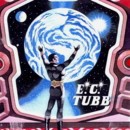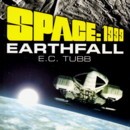In 2001, Chris
Bentley and David Sisson spoke to E.C.
Tubb at his home in London.
.. |
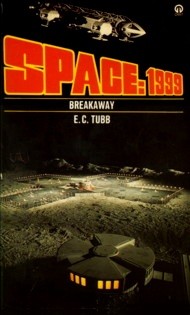 |
How
did you become a science-fiction author? Well, that’s a long
story. During the pre-war years I was a
great reader. I read everything I could
that was to do with outer space, lots of
the old pulp magazines, Edgar Rice
Burroughs and all of that, and I really
just enjoyed it all very much.
Then, of course, the war
came along and lots of families broke up
for one reason or another. You were taken
away, put with people who you didn’t
know, taken to a place you’d never
seen before and told to fight. It was a
bit of a shake-up for you. Then, if you
were lucky, you came home and were told
to carry on where you left off. I came
back and didn’t know what to do with
my life. I thought to myself that a new
life in Australia might be an idea
because a lot of people were emigrating
there at that time.
I needed to have a trade to
get out there and because I had done a
bit of bomb damage repair work, I put
myself down as a carpenter. I wasn’t
really a carpenter but I knew enough to
get myself through an interview. The idea
was that I would go to Australia, get
settled, and then my wife would come out
a few months later. At the very same time
as this, I had a short story published
for which I was paid, and so I decided to
stay here and give it a go as a writer.
The chances are that if I had gone to
Australia, the wife wouldn’t have
followed me over and I would have ended
up getting killed by a sheep on a sheep
farm or something!
|
|
| This
first story was ‘No Short Cuts’ in 'New
Worlds' magazine? Yes. That’s right. It was my
beginning. I did other jobs to support my family,
but gradually I earned more money from these
stories. I had some ups and downs along the way,
but I managed to remain as a writer for the most
part.
I learnt that, more than anything
else, speed was everything. You had to write fast
- don’t edit, just let it flow. Sometimes
what you wrote was awful, but mostly it was
alright and you got away with it. If you were
paid by the word, you would use all sorts of
little tricks to fill the page. I had characters
spending a whole paragraph just stubbing out a
cigarette and going through a door. It was like
that in those days. Nowadays, if I was writing
like that, I would spend ages describing a
character using a mobile-phone or something like
that.
I learned a lot of things in those
early days. I was naive and I was ripped off once
by a bloke who claimed that he was better known
than I was and would be more likely to have a
story published than me. He told me that once my
story was published, he would give me the fee for
it and I would have my foot in the door, as it
were, with the editor of this particular
magazine. Of course, the bloke didn’t give
me any money at all and claimed that it was his
story. I learned from that.
Another thing I learned was from an
old mate, a writer called Bill Temple. He taught
me that characters should just ‘talk’.
They don’t ‘hiss’ or
‘bark’ or ‘snarl’ like in the
old silent melodramas - you know the kind of
thing: “Get over here,” the villain
snarled. I stopped using all of those ridiculous
adjectives and found that it sounded better.
|
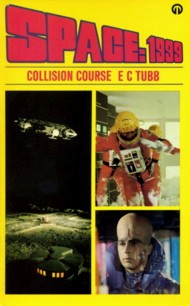 |
Were
you just writing science-fiction? Oh, no. I wrote whatever I
could to keep the money coming in. I did
westerns, a few thrillers and some
gangster things, but it was the
science-fiction that I personally enjoyed
obviously. I began to write under
different names, some of which were given
to me by publishers as they were
‘house’ names - such as King
Lang, Gill Hunt and Volsted Gridban.
Once, when I was doing a magazine called 'Authentic
Science-Fiction', I actually wrote
everything in one particular issue,
including the readers column. I had
deadlines to meet and I just had to do
it.
They were great days because
I met some good mates who had similar
interests but I also upset a few people
too. There was one fellow who was
desperate to get in print. I was an
editor by this time and I published one
of his stories and it wasn’t bad,
but I had to cut down on some of the
weaker parts of the story. It still read
well but this bloke was furious that I
had done it and never spoke to me again.
|
|
| People have this idea that
writing is a kind of romantic life but it
isn’t. If you’re already well off and
write to express yourself I suppose it is
romantic, but for me it was hard work. I had a
family to support and really just sitting in
front of a typewriter makes it a bloody lonely
life, not a romantic one. You don’t meet
anybody and you lose touch with the real world
because you spend all of your time in one that
you have invented - such as the one for the
Dumarest stories. Sometimes it was nice to do
something different, to have a break from what
you were always doing. I spent some time selling
knives and demonstrating things in markets and
that type of thing. I actually really enjoyed
that and I felt a bit like a priest, telling
people ‘the truth’ and they would
believe me. It was the same with the writing. To
make a break from the norm was quite refreshing
sometimes. Were the 'Joe
90' Action Transfer books a
refreshing break from the norm?
That’s right, I did those,
didn’t I? I can’t remember exactly how
many I did, maybe two or three, but it paid
pretty well and I was pleased to be doing
something a little unusual. Because the stories
were based on a children’s television
programme, I was working under certain
instructions from the publishers. I couldn’t
have 'Joe 90' or any of the other
characters using excessive violence. I mean,
these were supposed to be adventure/spy stories
about a lad who had a gun and all of that, but
you couldn’t have him shooting anybody or at
least only do very little shooting. You had to
keep the stories simple. The characters all had
to be different so children could recognise them
as goodies or baddies. You also had to have
things that they knew from the programme itself.
I suppose it was quite a relief for me as a
writer because it saved me having to invent all
of these things.
|
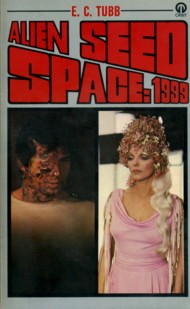 |
How
were you briefed about the show? I think I was sent some
photographs and some outlines about the
characters - what they looked like, who
they answered to, what the car could do
and all of that - and then I just created
a simple adventure story around it all.
The 'Joe 90' books were sort of
comic strips so I had to write stories
which would translate into good pictures.
I did quite a bit of
freelance writing for comic strips too
but it was always the ‘real’
writing that I enjoyed the most. When you
were writing for a book or a comic that
had characters who had been created by
other people, you had to write with that
in mind. By this I mean that, for
example, Commander Koenig in 'Space:
1999' was someone else’s
character. I didn’t know him like I
do Earl Dumarest, who is my own
character, so I had to think about how he
acted in the actual programme but with a
little bit extra that I enjoyed putting
in there myself.
|
|
| Did
you find it creatively constricting to write like
this? To a
point, but I was used to writing like that. Back
in my early days, I was often given stories which
were part finished or only early drafts by other
writers. I had to fill the story out but still
retain the essence of what was already there.
Other writers did the same to some of my stories
so it was something that many of us did. You had
to put in your own ideas while still being true
to what the other writer had originally come up
with, so when I did the 'Joe 90' books
and the 'Space: 1999' ones I did it like
that. Of course, with the television books you
also had to write something which the reader, who
was also likely to be a viewer of the particular
programme, would recognise too. You couldn’t
just please yourself if you were writing for
books based on a film or a television programme.
People expected certain things from certain
characters.
Within the
realms of a science-fiction story, you still tend
to use factual scientific themes and concepts as
a basis to what you write.
Yes, that’s true. When I was
first writing, I used all of the things that I
had soaked up about the real universe and
astronomy and so on. I had read other
people’s stories with characters going to
different planets without spacesuits or breathing
equipment and I just thought it was all a bit
daft. I always wanted to make the stories
exciting and interesting but I didn’t want
them to be totally silly and outrageous. I knew
about rockets and the pressures that space flight
can put upon the human body so I tried to put all
of that into my stories. I always felt that it
was a little unfair actually. I don’t claim
to be a scientist myself, but I am a writer with
an understanding of science. Yet there I was,
earning the same as people who were just making
up everything with no regard to realism at all.
But that was how it was.
|
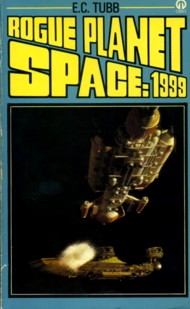 |
How
did you come to write the 'Space:1999'
novels? Well, I had the scripts
offered to me by a publisher who wondered
if I was interested in having a go at a
novel based on the programme. I was
pleased because I thought to myself,
“Great - someone else has done all
the hard work.” I sat down to read
these scripts and they were quite
entertaining but after a while, I
honestly thought that some of it was just
rubbish.
What
do you mean?
There was one part when
Bergman said something like, “My
God! His brain has swollen to three times
its normal size.” Well, I thought,
where did it go to? It just didn’t
make sense! To say that the brain had
swollen considerably would have been
alright, but three times is just stupid.
Another line was something like,
“His blood’s frozen
solid.” Now I know you need drama
and excitement and all the rest but it
should, to my way of thinking, be
plausible and some of these stories
weren’t.
|
|
| Did
you watch 'Space:1999'
on the television? Yes I did, although I have to say
that it got pretty ghastly towards the end of the
series. That is always the problem with a
continuing series of television programmes or
films, or even books for that matter. You tend to
re-use old ideas or borrow ideas from other
sources and it all looks a little tired.
'Star Trek' was the same and I love that
myself, but it happens there too.
The problem with 'Star Trek'
(in all of its incarnations) and 'Space:
1999' was the kind of village mentality:
everybody knows each other and looks out for
their neighbour and it’s an idealistic way
of life. With 'Space: 1999' in
particular, I felt that once they were off on
their journey there would have been more unrest
amongst the Alphans and I tried to put that into
my books. I mean, after a while, I would have
said to Koenig, “Who are you to still be in
charge of it all? Let someone else have a go or
we can run things by committee or
something.” Dramatically, I think that would
have worked very well because there would be
conflict and conflict brings drama.
The later episodes were
disappointing. I know that when they came on, I
was surprised that there were new characters who
I had never seen before and characters like
Bergman were gone without any explanation. It was
a shame because I thought Barry Morse was very
good.
Were you
ever invited to the studios or taken to any
special screenings of the programme?
|
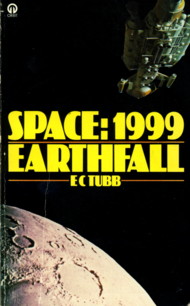 |
When I was given
the job of writing the books, I was taken
to a screening in London with the other
writers who were doing the books. I think
it was a cinema in Marble Arch and I saw
four or five episodes of the programme. I
was really impressed and thought that the
idea of doing them as books would be
quite exciting. The problems really came
along when you saw it in print. The
actual scripted words were sometimes
terrible. All criticism aside, I
thought the programme itself was
excellent and very entertaining, which is
what it is all about I suppose. For me as
a writer, I felt that for the novels the
original scripts would need some
alteration as well as something extra of
my own. For example, there was a sequence
in one of the episodes when Koenig walks
down one of the corridors and into Main
Mission. There was no dialogue but
because that Main Mission set was so
impressive it held your attention. On the
written page of the script that I had to
work from it just said, “Koenig
enters Main Mission from an adjoining
corridor.” That was it. I had to
fill that scene out to make it
interesting for the reader. Between that
and the various scientific
inconsistencies, I decided that for my
adaptations I would use the scripts only
as a basis for what became almost
original stories and I think that it
worked better that way. It sounds a bit
big-headed, but I thought,
“I’ll do it my way.”
|
|
| When I had done the books
based on the scripts for the series, the man who
was doing the editing for the company publishing
the books said to me that they had lost the
contract to do further books based on episodes
but that they still had the rights to do a couple
more using characters and ideas from the series.
He asked if I wanted to have a go so I said,
“Yes.” I was hoping that they would be
so well received that they might be used as
actual episodes of the programme itself. So I did
a couple of 'Space: 1999' novels which
were entirely my own stories, and then the
publishers asked me to do a final book, 'Earthfall',
as they were still contracted to publish one
more. On this one, I was allowed to end the
series in written form as I thought it should be
done. As a writer, it was quite a challenge for
me and very enjoyable because the idea of the
series itself was a good one. The concept for the programme was
interesting, but quite constricting for a writer
like myself who tried to be as scientifically
accurate as possible. The Alphans were supposed
to be travelling at the speed of light or
something and then every species they meet talks
English - it could have been a crab sitting on a
rock or something and it turns around and says,
“Hello, Commander Koenig. We’ve been
expecting you.” I know the characters have
to communicate but they created an idea which
gave them many problems in terms of realism and
scientific accuracy.
I was far happier with the original
stories I wrote for 'Space: 1999' and I
was especially pleased with that last one,
because I had the chance to really do something
interesting with the Alphans, projecting into the
future where they have had children, returning
them to Earth and all of that. I tried to
re-address the scientific failings of the series
and add a bit of human interest as well.
|
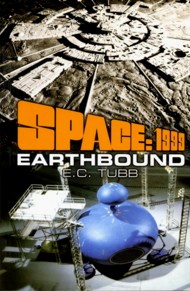 |
Did
you ever have the chance to discuss your
thoughts with any of the actual writers
for the programme? No, never. I was sent
scripts to work from and that was that. I
never met anybody involved with the
writing of the actual programme at all
but I think I would have liked to. I
think that I must have done alright
because the books sold well and were
quite popular.
Are
you aware that your 'Space:
1999' novels are
more highly regarded than the others
amongst fans of the series?
No, I wasn’t, but I am
very pleased to hear it. I don’t
know why because all the authors were
from similar backgrounds and I actually
knew a couple of them pretty well. One of
the writers flaked out. I think I
remember that he had the same sort of
problems with the original scripts as me
but couldn’t (or didn’t want
to) overcome the problems like I did. I
think it was Brian Ball. We all met at
the screening and we went for a meal
which was all very nice, but then we just
went off and did our own thing.
|
|
| Were
you sent any photographic reference to work from? No, I don’t think so. I was
very impressed by the design of the Moonbase
itself and the costumes and, of course, the
Eagles which I thought were very good. I
didn’t have to describe any of those things
too greatly in the books because it was obvious
that the reader would be more than familiar with
what they looked like from the series itself. I
was sent a brochure or something which gave me an
outline of how Moonbase Alpha itself was set out
and also which uniform colours denoted which
role: white was medical, red was Main Mission
crew, and so on.
Do you feel
that your own novels and stories would translate
well into television? The 'Dumarest
Saga' in particular has all
the elements for an exciting long-running series.
I’m not sure. I think one
obvious failing in all television and film
science-fiction is that you have writers who have
little knowledge of science. But on the other
hand, you can’t have scientists or
astronomers attempting to write television
programmes because they don’t know anything
about the business of making dramatic
entertainment. I will admit that it is hard
because, obviously, television programmes are
always meant to entertain (and 'Space: 1999',
'Star Trek', 'Battlestar Galactica'
and all the rest certainly do entertain because I
watch them all myself), but things do stand out
sometimes as being written by someone without
even the basic understanding of, say, light speed
or time travel as a concept.
You also have the problem of other
people then using your ideas in a way in which
you never really wanted them to be used. I used
to laugh at the different covers that would
appear on my Dumarest books, so I can’t
begin to imagine how I would feel if somebody was
making a film or television series of one of my
stories. I think it must be difficult for people
like Stephen King who create these characters and
then a film-maker changes this, that and the
other. I suppose the financial rewards ease
things a little.
Also I have never actually liked the
term 'The Dumarest Saga', that was
invented by the publisher and it just stuck, it
wasn't something that I would have chosen.
|
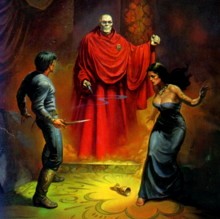 |
Do
you deliberately use certain words as a
kind of trademark, I always noticed that
'Tintinubulation' seems to appear
somewhere in every Dumarest novel. Really (laughs). No thats
not something that I do - or was aware
that I did. I'll have to look out for
that now.
If
Dumarest were to be made into a film or
television series which actor would you
see in the role?
I'm not
sure, but theres an actor in 'The
Bill' who plays a character called
Frank Burnside (Christopher Ellison), who
facially looks like the character to me -
he has that intensity.
|
|
| Speaking
of other television series, are you aware of the
striking similarities between 'Battlestar
Galactica' and your
Dumarest novels? I know what you mean, with the
Cylons in 'Battlestar Galactica' and my
characters the Cyclan in the Dumarest books: in
both cases, they are the villains and are sort of
robot-like. The heroes in 'Galactica'
are searching for Earth and so is Earl Dumarest,
my hero. However, I wouldn’t say that I was
ripped off or anything because we all use
different ideas and influences that we pick up on
our way. I remember an old saying we used to have
which was, “Science-fiction is a pool in
which you dip.” A great many fantasy stories
are about a search or a quest to find something
or someone, or in this case, somewhere, so I
can’t claim to have created that idea. The
Cylons were actually robots but my characters,
the Cyclan, are only robot-like because they are
based on the law of pure reasoning, like Vulcans
in 'Star Trek' really.
I actually quite enjoyed
'Battlestar Galactica' but there was all
sorts of ridiculous stuff in there too. Look at
those pilots in helmets with a ring of lights
around the face piece. Why, in total darkness,
would you want little lights just in front of
your nose?
Even though
you are a serious science-fiction writer, you
still talk as if you are a fan of all this type
of thing.
|
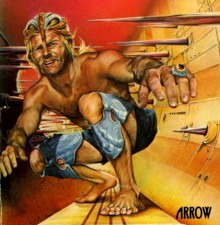 |
Well, that’s
because I am a fan. I can pick holes in
it all and that is half of the enjoyment
of it. I tape 'Star Trek' if
I’m going out and I always look at
the films when they are on the
television. Science-fiction has always
meant a great deal to me. Like
yourselves, I used to organise
conventions although in my day it was a
different sort of fandom to what there is
now. My original taste of
science-fiction came in the 1930s. It was
a time of depression and those stories
gave me hope and a view of the future
which wasn’t as bleak as the one
other people might have had. Then the war
came along and it shook everything up. Of
course, there was a great deal of death
and unhappiness caused by it, but in many
respects it was a good thing, because it
pushed people into space through the
development of rockets and missiles, and
medical science moved forward in leaps
and bounds.
|
|
| When I first met up with
others who had the same kind of interests, I was
so pleased because I could talk about rockets and
satellites and all of that without being branded
a nut-case. As a
science-fiction fan, I write stories that I want
to read myself and, in fact, I do go back and
read all my old books because I find them very
entertaining. I suppose I imagine that other
people who share my enthusiasm for
science-fiction will also be entertained by the
stories that I write, and if that is the case,
then I am delighted.
* *
*
|
|
|
